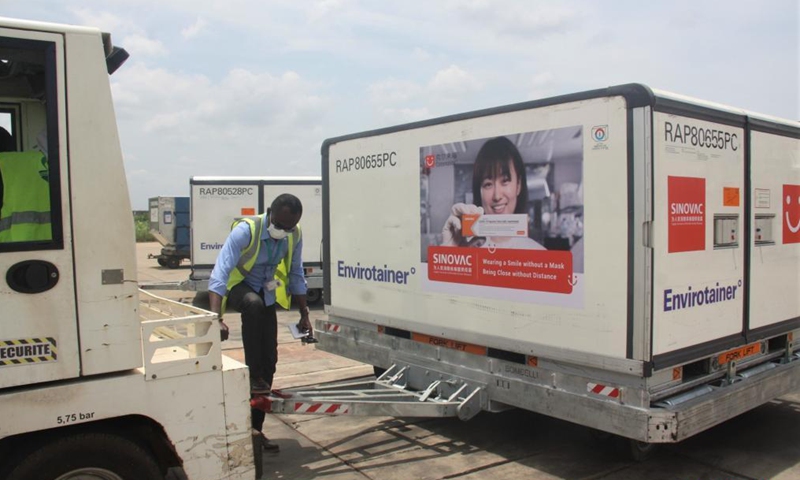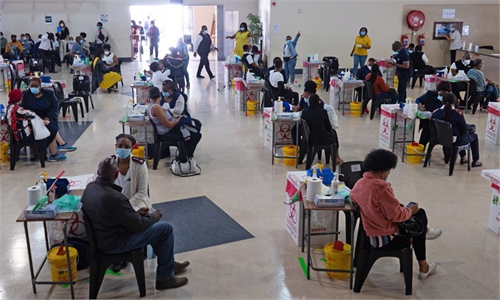
Boxes of Sinovac vaccine donnated by China are seen at the Gnassingbe Eyadema International Airport in Lome, Togo, April 23, 2021. The government of Togo received a batch of Sinovac vaccine donnated by China on Friday in support to its fight against COVID-19 as part of the cooperation between the two countries. (Photo:Xinhua)
While some foreign media outlets cited individual incidences and inconclusive evidence to stir up a new wave of criticism against the efficacy of Chinese vaccines, the real-world effectiveness studies of Chinese company Sinovac's vaccine in Chile show higher levels of protection against the virus' spread and hospitalization.
The latest academic report published on Wednesday revealed that large-scale real-world data proves Sinovac's vaccine, named CoronaVac, is 65.9 per cent effective at preventing symptomatic cases, 87.5 percent in the prevention of hospitalization, 90.3 percent against ICU admission, and 86.3 percent against coronavirus diseases-related deaths.
The overall results suggest that the CoronaVac vaccine had high effectiveness against severe disease, hospitalizations, and death, underscoring its potential to save lives and substantially reduce demands on the healthcare system, said analysts.
The research covering 10.2 million participants showed that the inactivated vaccine provided very similar protection to the general population over 60 years as it does for other groups.
The results are highly valuable as a reference, as Chile has the highest testing rates for COVID-19 in Latin America, universal healthcare access, and a standardized, public reporting system for vital statistics, according to the researchers.
Although Chile experienced an increase in infections from mid-May to early June, Zhuang Shilihe, a Shanghai-based expert closely following the vaccine research, said it was mainly due to its national non-lockdown policy, in a response to CNBC's recent report that highlighted six countries where Chinese-made vaccines were used with still high COVID-19 infection rates, including Chile.
Coronavac's efficiency against hospitalization was reported as over 90 percent in studies in both Brazil and Indonesia, getting local appreciation for its contribution in largely bringing down infection rates and effectively avoiding a medical system collapse.
As Sinovac successively released its promising results from its studies on vaccine efficacy across many countries, alongside increasing worldwide orders, the Western media's hypes over the efficacy of Chinese vaccines citing weak or incomplete evidence resurged again in recent days.
Some Western media including Reuters on Wednesday underlined the differentiation to Singaporean residents with the Sinovac jab in terms of local vaccination perks such as testing exemptions, quoting Singaporean Health Minister Ong Ye Kung, implying that the Singaporean government is discriminatory against recipients with Chinese vaccines.
So far, only Moderna and Pfizer-BioNTech's vaccines are under Singapore's national vaccination programme for free shots.
In a previous response, Singapore's Health Sciences Authority (HSA) said it is still awaiting additional data of CoronaVac, especially for data on the contagious Delta variant, before it can be granted for privileges such as exemption from Pre-Event Testing (PET), according to the Singaporean health ministry's statement on Monday.
Each country has its own protocols and standards for overseas approval. To be included in a government's national immunization program, Chinese enterprises have to complete the entire application and approval process, Feng Duojia, president of the China Vaccine Industry Association, told the Global Times on Sunday.
As the Delta variant sweeps the world, researchers are still in lab studies to track how well CoronaVac can protect against it, and the relevant results of the CoronaVac vaccine will be published in an academic paper in the coming days, the spokesperson of Sinovac Liu Peicheng told the Global Times on Thursday.
Reuters reported that the efficacy of CoronaVac on neutralizing Delta mutant strains was reduced three times, but Liu claimed it is "not accurate and complete."
China's top epidemiologist Zhong Nanshan said on June 28 that Chinese vaccines are effective against the Delta COVID-19 variant first detected in India, urging more people to get vaccinated.
All existing COVID-19 vaccines are developed based on variants circulating in 2020, so their efficacy against the Delta variant would roughly be the same. If Sinovac's efficacy declines, so will that of others, said Feng.
There has not been any comparing research on the vaccines' efficacy against the Delta strain so far, but it is globally agreed that these existing vaccines remain effective against the Delta variant, and the WHO has not yet released warnings to ask vaccine producers replace variants for production, Feng noted.
A Beijing-based immunologist told the Global Times on Thursday on condition of anonymity that in theory, inactivated vaccines carry all antigens of the virus, so they are able to neutralize a wider coverage of variants. Its efficacy against mutations should be better than the mRNA vaccines, but this requires further evaluation.
The Western media's misguided opinions did not dampen Chilean public's confidence regarding CoronaVac. As of Saturday, a total of 17,296 individuals have received one dose of the CoronaVac vaccine, with only two non-serious adverse event reports being received, according to the Chilean health ministry.
A Singaporean citizen who prefers not to be named told the Global Times on Thursday that some elderly or vulnerable people, such as allergy suffers, who were hesitant about the two innovative mRNA vaccines available in Singapore are more inclined to go for the CoronaVac - a safer and more traditional choice.
Regarding normal attempts as prejudiced decisions
Many Western media outlets such as CNN on Wednesday widely circulated a so-called leaked memo from Thailand which "raises concerns over Sinovac vaccines' efficacy." The document prompted calls for medical workers in Thailand to get an mRNA booster shot after completing two CoronaVac jabs, though denied by the national senior health official Opas Karnkawinpong for its authenticity.
Experts told the Global Times that mixing and matching different types of vaccines has been a typical practice for many countries and regions such as Singapore, Britain as well as Hong Kong to boost effectiveness.
Such routine attempts do not represent a denial of the effectiveness of current vaccines they use, they stressed.
Chinese researchers are also keen to see if the mixed jabs can bring better immune responses, the Global Times learned from various COVID-19 vaccine producers in China.
Death cannot overturn momentum
The news ofan Indonesian scientist who heads in studying Sinovac vaccines suspectedly dying of the COVID-19 becomes another kindling for some media to challenge CoronaVac on Thursday. However, BioFarm, the institute where the scientist Novilia Sjafri Bachtiar worked, has not confirmed the cause of her death, and whether she has been fully vaccinated by CoronaVac has not been understood yet.
"If she was a confirmed fatality from the coronavirus disease after two CoronaVac shots, we can then deduce that Sinovac is less than 100 percent effective at preventing deaths, which is in line with real-world data from countries like Chile and Brazil. But this does not mean that previous data sets are unreliable because the pandemic is evolving, nor does it deny the overall effectiveness of the vaccine in the slightest," the Beijing-based anonymous immunological experttold the Global Times on Thursday.
The death of the Indonesian scientist would not refute Sinovac's previous clinical trials data. Moreover, factors causing death after shots are complex which may include disease coupling, silent infections, personal immune system failure or adverse reactions to drugs, Feng said.
Experts appealed to the media to stop amplifying biased, unfavorable, and misleading information about Chinese vaccines, and to try to build people's trust in Chinese-made vaccines and follow scientific data and guidelines especially at a time when vaccines against COVID-19 are still much needed globally.

